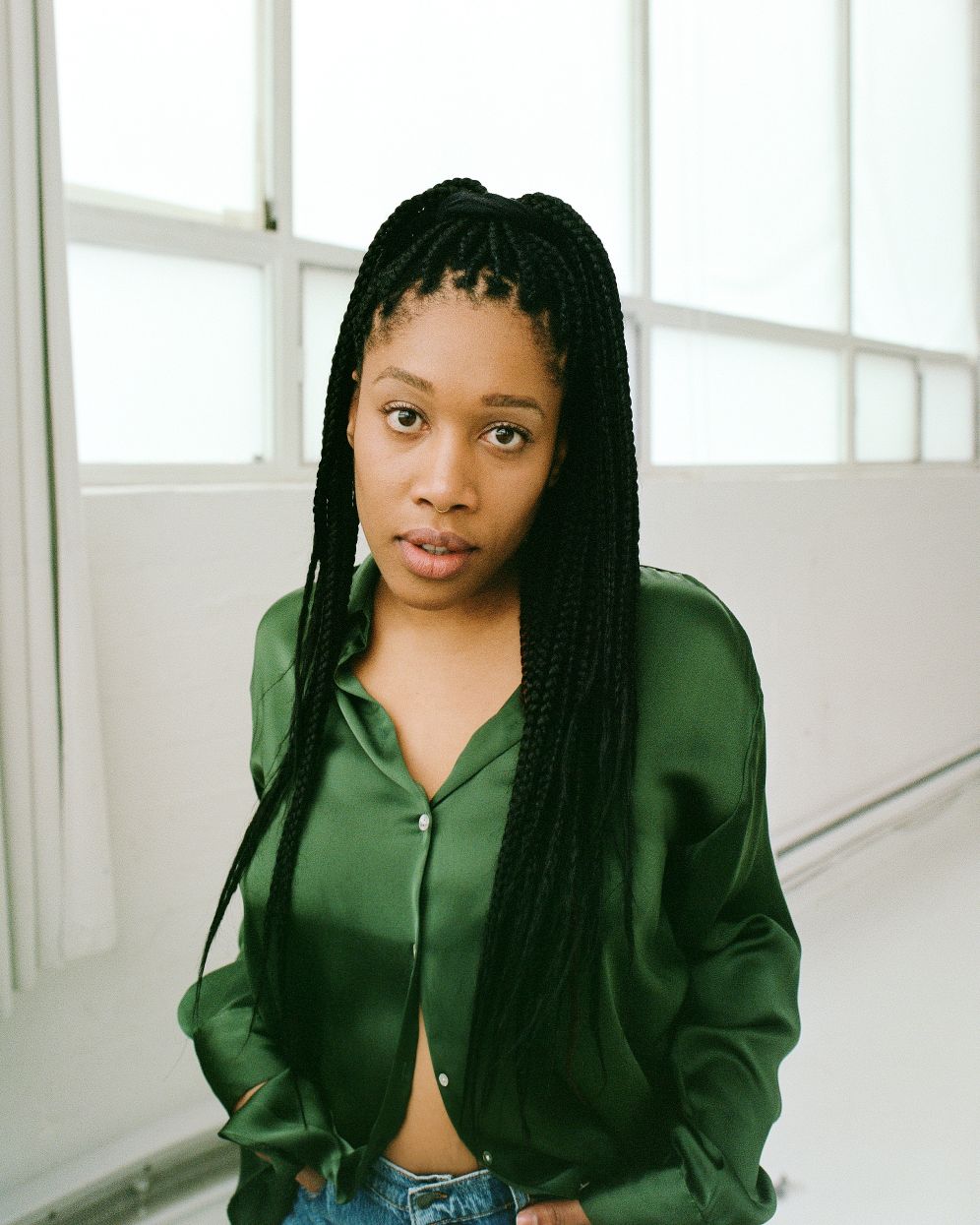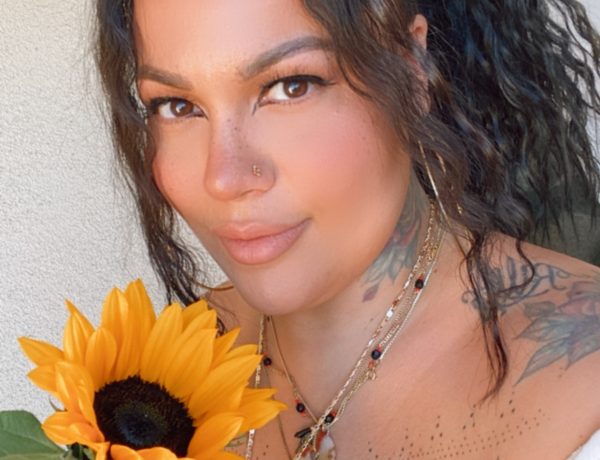Filmmaker and actor Aisha Evelyna resolved to turn her devastation into something powerful, choosing to write her latest project ALEX in response to George Floyd’s murder. “ALEX’s cinematographer, J Stevens, reached out to me at the height of the hurt and confusion that I think we were all experiencing after George Floyd’s murder,” she says. “We’re both doers (big Leo energy), but we were in lockdown and getting news in a sort of mix of dribs and drabs and sudden huge waves, trying to get our feet under us, to turn our feelings into action. We were talking about collaborating on something in the vein of another film I had made, SHOEGAZER. I was so lucky to be working with J at that time – like I could be very introspective with them. We spent time dreaming about the kind of world we wanted to see and art we wanted to be making, and ruminating on what the face of racism looked like in 2020. Before we knew it, we had broken the story for a script. Once I had a beat sheet, I brought it to J and they liked it, and now we have a film!”
Naming the film after Alex calls attention to the way Black people are scrutinized in public spaces. “During the dreaming process, I had told J about the time that a painfully polite bank teller prevented me from cashing a cheque – oblivious to how they were doing everything possible to tell me that I wasn’t trustworthy enough for normal rules to apply. J immediately understood, and introduced me to ‘an Alex’ – a polite Karen. That hard-to-pin-down idea became central to the story, and is why we named the character Alex. Even though ‘being an Alex’ never really caught on in the zeitgeist, it seemed fitting. I liked the title ALEX because although this film centers the experience of a Black woman (Sydney), this film is really about Alex and the need for her to change.” This choice also parallels society‘s tendency to automatically center white narratives – a very intentional decision on Aisha’s part. “I was hoping to lean into that trope to drive the point of the story home. Sydney’s experience gives the film an emotional center, but Alex’s character makes the story poignant and drives the film’s thesis home. She asks viewers to analyze how they are complicit in an inherently oppressive system.” Alex embodies the omnipresent, all-consuming skepticism that the Black community is subjected to. “Alex does represent the surveillance of people of color – but going further, she represents judgment. The brainworm logic is that Black people are surveilled because Black people are to be feared because Black people are dangerous. It’s so wildly untrue, but it’s the component that I find the most interesting – the fear, the associated judgment, and what it gives people permission to do to us. Alex and her actions ask audience members to think: to question where the motivations for their judgements come from, and to demonstrate how damaging these misplaced, fear-based judgements can be.”
Aisha drew from her own experiences to write ALEX. She finds herself unjustly bearing the weight of white fear and contempt the minute she walks out her door. “I feel like it’s been said thousands of times before but I literally cannot move in public spaces without worrying about being accused of theft, or some other wrongdoing. So if I’m in a store, and I pick up a tiny item, I hold it far away from me, in view of store employees, just so we can all stay on the same page. I have to work from this premise that there are people who are going to feel threatened by my mere existence. Because the consequences of somebody getting confused and going off half-cocked are just too high to let down my guard. Which is something I think gets forgotten in this conversation: I am scared, too. Living with these kinds of rules of engagement, in order to keep myself feeling safe, can be very draining and upsetting. It’s this feeling of being out of place and out of touch in a white world that I drew from for the film.”
So, why do so many people feel entitled to police or engage in vigilante justice when it comes to Black people in public? “I feel like the answer to that question is between those people and the therapists they are clearly not seeing. But, it’s white supremacy, right? It’s this entrenched, all-present messaging that positions white people, white sensibilities, and white comfort above everything else. The rules are for them. We are guests moving through spaces only because they let us. All grievances involving people of color are personal. So there is this tacit permission to take control and act out in a way they never could or would with a white person. ‘I am above you, so the ‘rules’ state I can control you and the situation, and if you fight back that’s another affront – it disrupts the way things should be.’ Alexes, Karens…they’re cute names but they are identifying a real problem with how we relate to each other. These people take up space and feel entitled to police us, because they’ve been told that it is their place to do so.” Performative allyship may stroke egos, but it does little to affect actual change. “For me, the problem with performative allyship is that it allows people to excuse themselves from actually doing the work. We are talking about systems of oppression that affect all marginalized people – not just Black people. It’s a big deal. It’s climate change – existential. Being sympathetic, without taking concrete action, just lets off steam and slows the changes (public and private changes) that need to take place. It puts the burden of change solely on the marginalized, who are already working against a stacked deck. Actual allyship means accountability. It means acknowledging the issue, owning it, and then acting. Performative allyship just adds to the noise.”
Beginning to move away from these hollow gestures starts with being open to educating yourself, says Aisha. “My opinion is only one of many, but in my eyes moving from virtue signaling to allyship means embracing real empathy. It means really committing to asking why we think or act the way we do, and how we change and make change. In the film, all Alex had to do was to step outside her gut reaction, and consider Sydney as a person. ‘I couldn’t find the bra – she’s a thief!’ only seems like a simple explanation until you think about it for more than five seconds. It takes for granted so many extra steps and ignores everything about their interaction up to that point. Is there a simpler, more realistic explanation? Alex never bothers to ask herself this question. She only knows that her job is threatened (‘I’m the keyholder!’) and she short circuits on the internalized narrative that tells her that Black people steal. So we can take this form of curiosity and ask ‘Does posting this Black square to my IG really change anything? Do I have the capacity to go deeper?’ That could be anything from reading an article on a topic before taking to social media to share your outrage, to attending a local event about a cause you care about, to questioning how you tense up or habitually react to people that are different from you, and challenging yourself to understand what judgements are actually serving you and where they may be stemming from.”
Never stop pushing yourself to examine your own ideologies. “I think the biggest ways we can examine ourselves and our biases is by remembering to ask ourselves questions about how we perceive what we are perceiving, and taking a committed assessment to understand if these views held about anyone, be they people without houses, people with addiction, men, woman, members of the 2SLGBTQIA+ community, or people of color are based in an antiquated oppressive understanding of the ‘other.’” Do your own work instead of expanding other communities to carry you. “I think it’s a little exhausting for people of color to be the ones to lead people with privilege toward moral responsibility. The answer to solving this problem is not monolithic. I made a film about my experience and how I see the world, and my experience is nuanced and one of many. I say regardless of how you identify, if you think you have a problem with how you look at another community, that’s the first step, and if you had the wherewithal to identify an area of friction, you probably have the capacity to course correct or learn more.” ALEX will be screening at the 2022 Austin Film Festival on October 29th and at the 2022 Whistler Film Festival this November 2022.
Read more Celebrity Interviews on ClicheMag.com
Aisha Evelyna Calls Out “Polite Karens” and Performative Allyship in New Film, “ALEX.” Photo Credit: Courtesy of Project Four PR.





